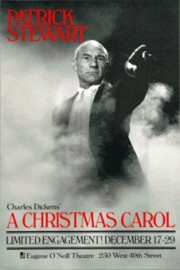|
Home
|
Apr 29, 2025
This week’s themeWords that aren’t what they appear to be This week’s words windlass monopolylogue lustration unicity piepowder 
A Christmas Carol Broadway Poster
Watch a preview (4 min) Image: Wikimedia A.Word.A.Day
with Anu Gargmonopolylogue
PRONUNCIATION:
MEANING:
noun: A performance in which one person plays multiple characters, typically all of them.
ETYMOLOGY:
From mono- (one) + poly- (many) + -logue (talk). Earliest documented use: 1819.
NOTES:
Despite what the name might suggest, a monopolylogue is not an
economics lecture. It’s theatrical multitasking: one actor, many hats
-- sometimes literally. I say we extend the word to a scenario when
someone monopolizes a conversation. Not a dialogue any more.
Linguistic fun fact: the poly in monopolylogue comes from the Greek
for “many”, whereas in monopoly it comes from the Greek for “selling”.
So while one is about many voices, the other is about one seller.
Ironically, both can leave the audience with no choice. The word was coined in reference to British actor Charles Mathews, whose solo show At Home had him playing all the parts. A kind of one-man flash mob. Charles Dickens followed suit and performed monopolylogues of his own work to adoring crowds in the UK and the US. In recent memory, Patrick Stewart boldly went where few thespians have gone before, performing all 40+ characters in A Christmas Carol. Tiny Tim, Scrooge, the ghosts -- he was all of them. Now that is a true Federation of personalities. USAGE:
“Viewing the performance as a monopolylogue shows us the characters
of the protective mother, the rebellious child, the crazy grandparent,
and then the slippage of these identities into the possible universal
experience of fear and loss.” Veronica Baxter; “Intimate Exposure” in Forays Into Contemporary South African Theatre (Marc and Jessica Maufort, eds.); Brill; 2020. A THOUGHT FOR TODAY:
This world is divided roughly into three kinds of nations: those that spend
lots of money to keep their weight down; those whose people eat to live;
and those whose people don't know where their next meal is coming from.
-David S. Landes, author, professor of economics and history (29 Apr
1924-2013)
|
|
Subscriber Services
Awards | Stats | Links | Privacy Policy
Contribute | Advertise
Awards | Stats | Links | Privacy Policy
Contribute | Advertise
© 1994-2026 Wordsmith